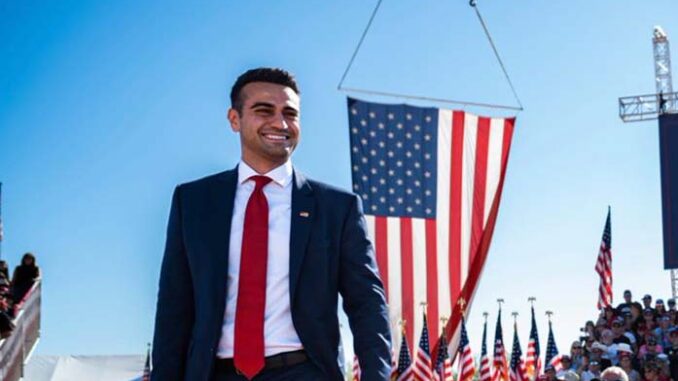
For Abe Hamadeh, his continued effort to challenge the outcome of the Arizona Attorney General’s race is about due process and ensuring every legal vote was properly counted.
On the other side is now-Gov. Katie Hobbs and new Attorney General Kris Mayes, who along with new Secretary of State Adrian Fontes want a Mohave County judge to shut the courthouse door on Hamadeh and end all inquiries into which AG candidate actually received the most votes.
It is a position Hamadeh’s legal team took aim at Monday with its latest filing to Judge Lee Jantzen in support of a motion for new trial in the challenge to Mayes’ recount win by 280 vote out of more than 2.5 million ballots cast. But more than 75,000 ballots statewide were reported as having no vote for attorney general, which is referred to as an undervote.
According to Hamadeh, Hobbs -the then-Secretary of State- knew of problems in Pinal County with ballots being incorrectly tabulated as an undervote. But Hobbs, her staff, and her attorneys kept that information secret from Jantzen during a Dec. 23 trial as part of Hamadeh’s election challenge.
The information was not publicly revealed under Dec.29 when the statewide recount results were read in a Maricopa County courtroom. As a result, Hamadeh wants to inspect all ballots reported statewide as an undervote.
“This Court should not reward Defendants’ tactics of misrepresenting critical facts and withholding relevant evidence such that it tarnishes the election process for years to come,” the Feb. 6 reply brief reads. “In fact, this Court is the most appropriate forum to redress the 2022 election maladies. Judges, not executive branch nor election officials, are the arbiters of justice.”
The brief was written by Jen Wright, the newest member of Hamadeh’s legal team. Wright, who resigned in December as the Assistant Attorney General in charge of the Election Integrity Unit’s civil division, argues that Hobbs’ counsel should have advised Jantzen before or during the Dec. 23 trial that the Secretary had information which supported some of the issues raised by Hamadeh.
This was particularly critical, she wrote, because a visual inspection of about 2,300 Maricopa County ballots prior to the Dec. 23 trial found more than a dozen that should have been recorded as a vote for one of the candidates, a problem Election Director Scott Jarret admitted to under oath.
Information about Pinal County would have further supported Hamadeh’s claim of tabulation problems. Instead, Jantzen ended up dismissing Hamadeh’s election challenge for a lack of sufficient evidence.
Then on Dec. 29, that evidence was revealed by Hobbs’ own attorney and the Secretary’s election director during the announcement of a statutory recount held due to the close margin. Hamadeh filed a motion for a new trial two business days.
But Jantzen is being urged by Mayes and Fontes to send Hamadeh on his way, arguing he had his shot at a trial and it is now too late to do anything more. It is a position Wright takes issue with in the new brief.
“Sadly and unsurprisingly, Defendants wish away the guarantees of due process, ignore longstanding precedent, and cast aside material facts for fear of confirming what the evidence will undoubtedly prove: Abe Hamadeh, not Kris Mayes, received the most votes for attorney general when every qualified vote is accurately counted,” she wrote.
Wright also points to serious question about the rate of ballots marked as an undervote in Maricopa County. If the misread rate of 0.61 percent was applied to all 50,247 undervotes reported in Maricopa County, it could mean 300 or so voters who did not have their will properly reflected in the final results, she writes.
Another issue Hamadeh believes needs to be further investigated is the few hundred people in Maricopa County whose provisional ballots were rejected during the 2022 General Election for being unregistered voters, despite voting in at least one other election between 2018 and the August 2022 primary.
“Critically, if similar errors occurred statewide, it would likely be outcome determinative in this exceedingly close race,” Wright notes. “Plaintiffs simply want to ensure that every lawful vote is counted such that no voter is disenfranchised by way of machine or human error,” Wright wrote.
Unusual Undervote Rate Raises Questions About Arizona’s 2022 Election Results
In the meantime, Mayes is asking the judge to reject an amicus curiae (friends of the court) briefing filed last week by Senate President Warren Petersen and House Speaker Ben Toma.
As the two top members of the Arizona Legislature, Petersen and Toma filed the brief urging Jantzen to grant Hamadeh a new trial. Their brief stresses the importance to all Arizonans of an “accurate tabulation of every legal vote” in the AG race
Petersen, an attorney, and Toma take no position on who actually received the most votes. Instead, the brief notes their interest in “ensuring that the certified winner of an election did, in fact, receive the highest number of lawful votes.”
But attorneys for Mayes argue no reason exists for granting the motion to admit the amicus brief, describing it as failing to provide any “unique information or perspective” that could possibly be helpful to the judge.
Top Arizona Lawmakers File Brief Supporting New Trial In AG Vote Count
Jantzen is expected to rule later this week on whether he will schedule oral arguments on Hamadeh’s motion for a new trial.
There are also outstanding motions awaiting the judge’s ruling about how much money will be paid to various people who assisted in the inspection some ballots prior to the Dec. 23 trial. Another motion before Jantzen is a request from various parties for an award of attorney’s fees in connection with that trial.
